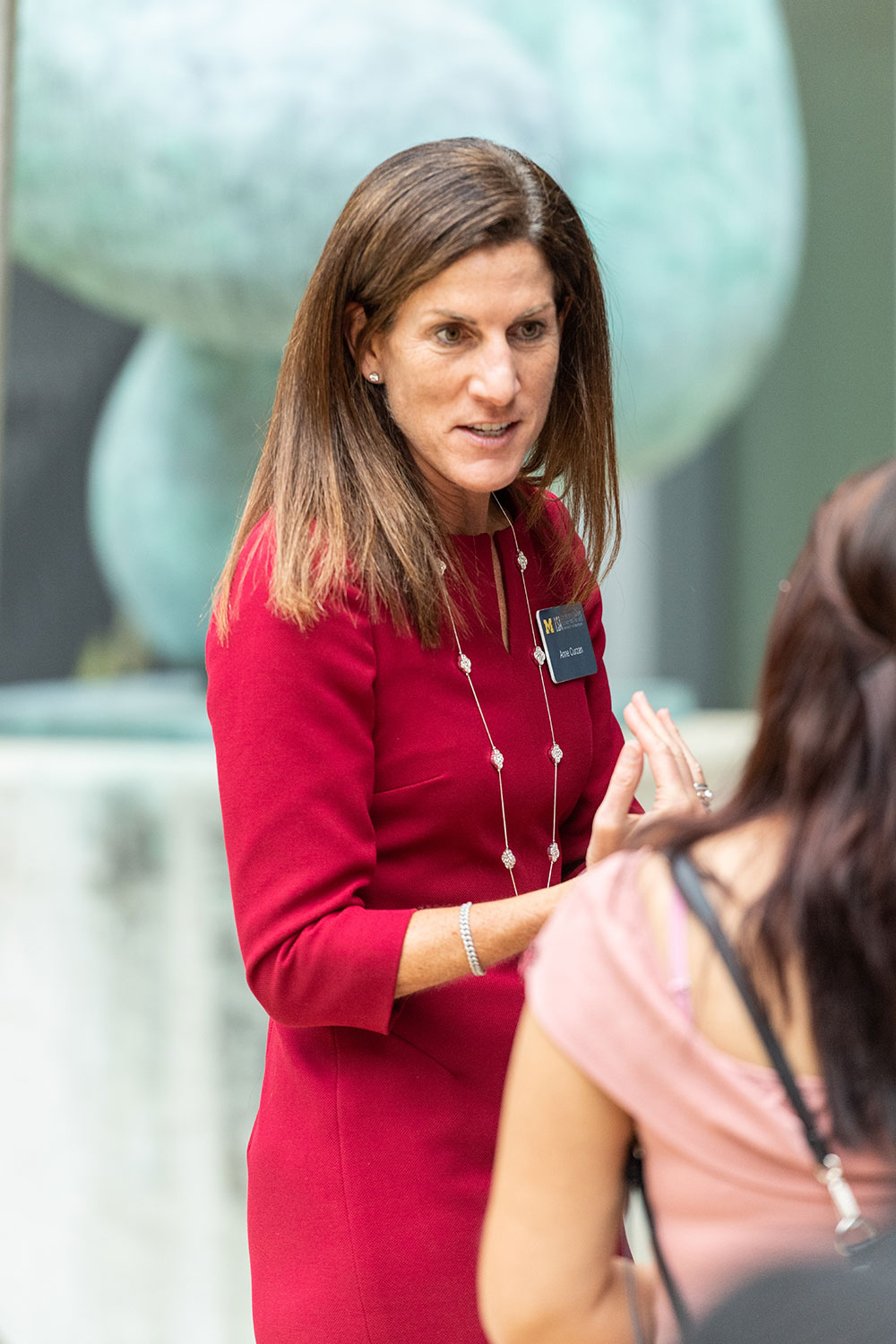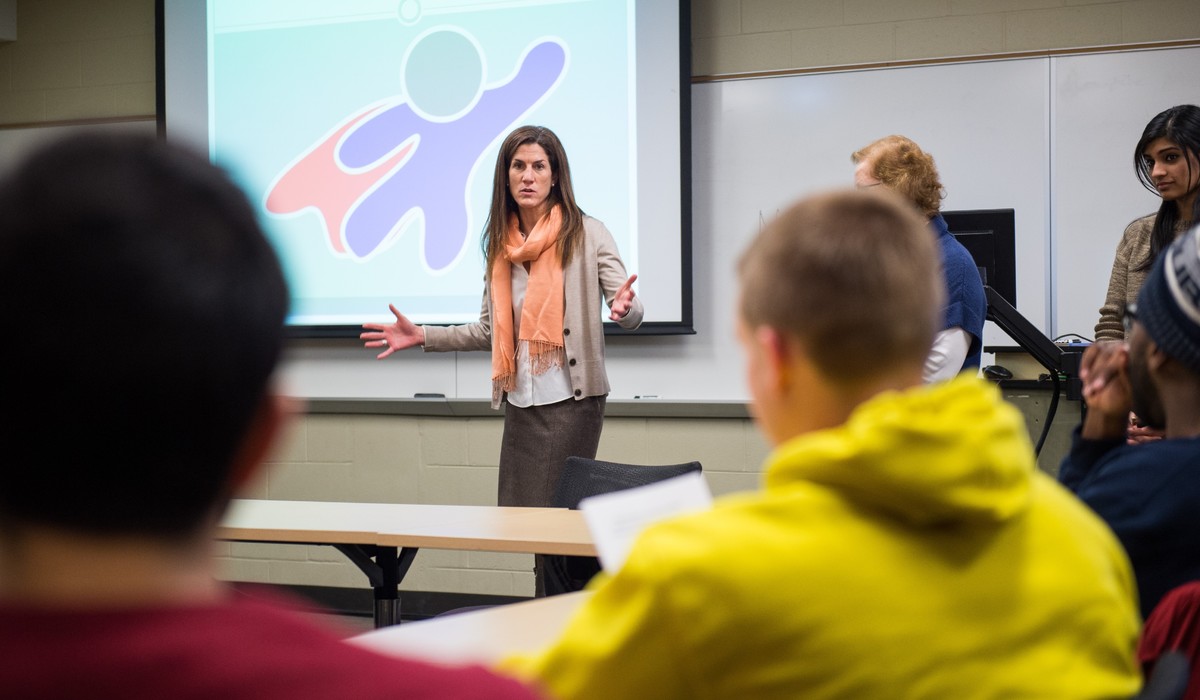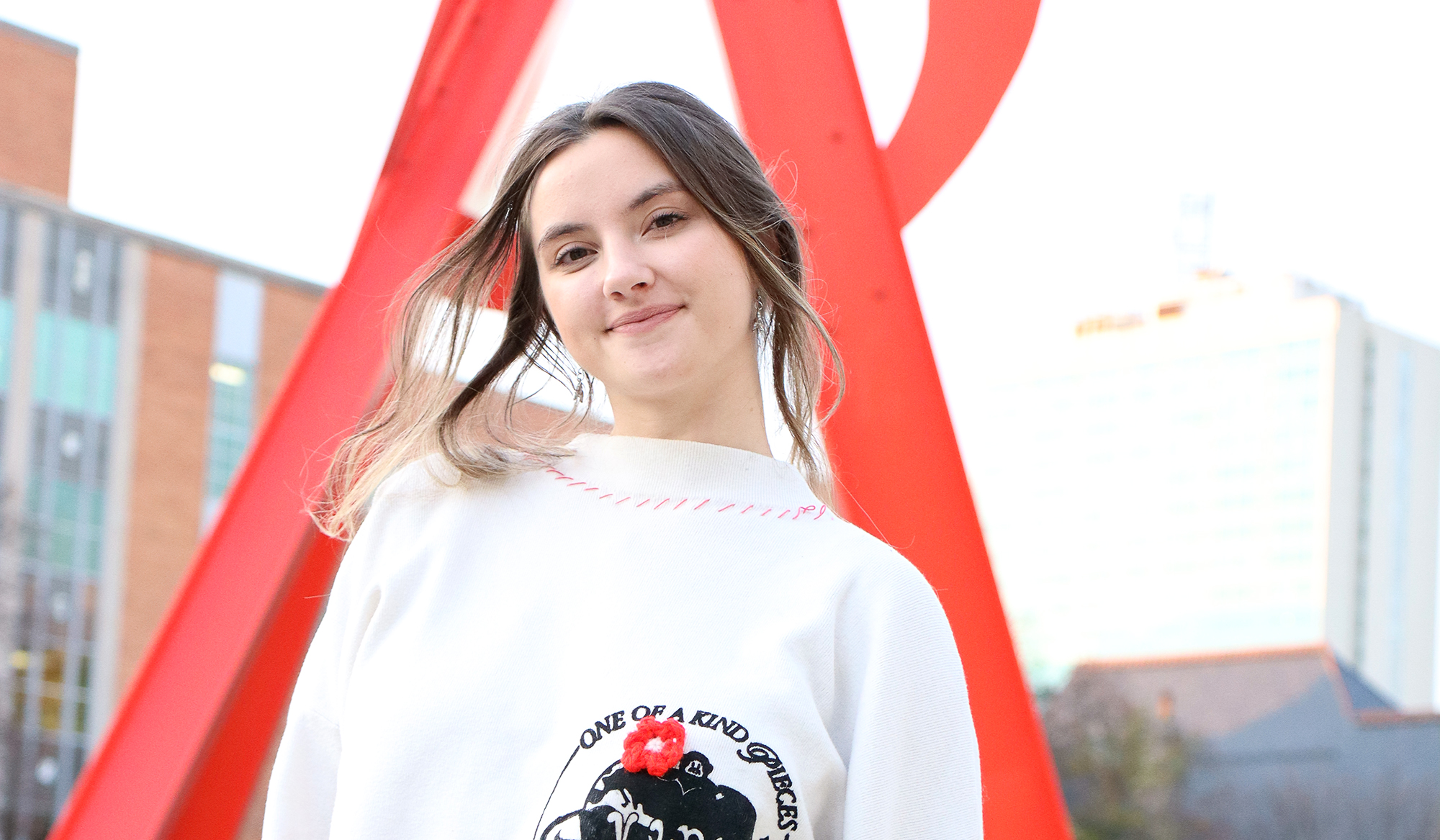
The Literature, Science, and the Arts Building has prime real estate on U-M’s campus: right on State Street, next to the Michigan Union. And it bears the name of the University’s largest college.
Yet many of LSA’s 18,000-plus undergraduates never go inside.
LSA’s new dean, Anne Curzan, MA’94, PhD’98, acknowledges this contradiction. “There’s a way in which LSA is both everywhere and nowhere at the same time,” she says from her office. “When I hold office hours here, many of my students say, ‘I have never been in this building.’”
Curzan knows the college, which spans dozens of departments—from Afroamerican and African Studies to World Performance Studies—has sustained criticism that it is large, decentralized, and somewhat lacking in community spirit. That’s an especially relevant situation in an age when many in the career class disparage the professional value of a liberal arts education.
But she is ready for that to change.
In January, Curzan oversaw the opening of the LSA Opportunity Hub, an addition to the LSA Building where students can connect with peers, find internship opportunities, and network with alumni mentors.
“It supports students when we say you can and should major in what you love,” Curzan says. “And you will get the best education if you’re majoring in something that is meaningful to you, that gives you purpose.”
The new dean didn’t wait until the grand opening in January to connect with students. During fall 2019’s Welcome Week, students passing by the LSA Building found Curzan out on the front lawn, playing a beanbag toss game and inviting them to join.
For her, having fun with her arriving students was “part of helping people embrace the joy and play that comes along with the challenge and the rigor.”
That game? It’s one of the oldest tricks in the book for college socializing. Many call it “cornhole” and play it at football tailgates. But Curzan calls it “baggo.” And since she’s one of the world’s foremost experts on the history and evolution of the English language, well, baggo it is.
ORIGINALLY FROM MARYLAND, Curzan entered Yale University as a mathematics major before, on a whim, taking a class on the history of the English language and falling in love with linguistics as a subject. “I tell this story to undergrads all the time,” she says, “because I’m always trying to open up space for them to explore and change their minds.”
She now teaches the same English language history classes she once loved.
“I could immediately tell that she was incredibly smart and cared about what she was teaching,” says Kyle Grim, ’10, who took Curzan’s class during her senior year. “I truly wish I had taken it earlier.”
Grim, a high school English and Spanish teacher in Shepherd, Michigan, says her approach to teaching the grammar and linguistics of both languages is heavily inspired by Curzan’s methods. Grim also keeps “How English Works,” the textbook Curzan wrote and uses to teach the class, in her classroom as reference.
Curzan, who first came to U-M to pursue her master’s and PhD in English literature, has been a member of the U-M faculty for 18 years and has held several administrative roles during her academic career, including associate dean for the humanities within LSA. From 2012 to 2016, she was the U-M faculty athletics representative, helping manage the relationships between the University’s academic and athletic institutions and serving as U-M’s voice within the NCAA and Big Ten Conference.
But what first lured Curzan to U-M, she says, was the fact that it was the home of the Middle English Dictionary, a database of now-forgotten lexicon in use from the year 1100 to 1500. That dictionary, while a great resource for research purposes, falls into a category of academia that Curzan refers to as “knowledge for the sake of knowledge.” To her, an ideal institution balances those types of resources with another category— “knowledge for real people in real time.”
Curzan is dedicated to expanding the latter, which is one of the reasons she has embraced the role of public intellectual over the last decade, specifically, a public intellectual who wants intellectuals to listen to the public. In 2014 she delivered a TED Talk—titled “What makes a word ‘real’?”—in which she implored her colleagues to embrace, rather than “correct,” the ways young people are changing language. Then-modern slang like “defriend” and “hangry” shouldn’t be dismissed outright, Curzan argued, but instead embraced as part of the evolving nature of communication.
“We should be less quick to decide that change is terrible,” she said in the talk. “We should be less quick to impose our likes and dislikes about words on other people.” Her message was quick to find an audience. To date, the TED video has racked up close to 2 million views.
From 2012 to 2018, Curzan was an author for the Lingua Franca blog at The Chronicle for Higher Education, opining on linguistic quirks such as how words like “taser” became verbs. And her weekly segment on Michigan Radio, “That’s What They Say,” breaks down modern slang from an academic perspective. U-M itself has taken advantage of Curzan’s gift for public-facing rhetoric, enlisting her to write a column on language for Michigan Today and host monthly online videos for the LSA Wire.
Curzan says she takes on these duties because she wants her research to extend to people who have real-world power and tend to make decisions (like who gets certain grades or certain jobs) based on specific ideas of how working professionals should talk. “The gatekeepers are the teachers, lawyers, newspaper editors, employers who are controlling who’s getting jobs,” she said. “And I thought, ‘I want to talk to those people.’”
Among the topics she wants to talk to them about is what she calls “linguistic diversity,” which is the tendency of people from different races, ethnicities, and socioeconomic backgrounds to speak in different ways. Educational systems, Curzan says, have traditionally been devoted to stamping out linguistic diversity, with teachers and professors imposing one uniform way of speaking onto students who have no experience of speaking in that manner.
Curzan tries to practice what she preaches by broadening her own linguistic knowledge. Before each session of her History of the English Language class, the professor has her students teach her two new slang terms.
But she has to be careful about using them: Younger generations are very protective of their words, and she doesn’t want to breach their trust. “I am not allowed to adapt because I am too old,” she says with a laugh.
YET OLDER PEOPLE—alumni in particular—certainly have their place in the new LSA. Curzan’s plans for the Opportunity Hub depend on a steady stream of alumni willing to provide mentorship and career counseling to students still figuring out their lives.
“LSA alumni are one of our richest resources,” says Curzan, also citing the community’s support of scholarships, internships, and research as integral to the college’s success. One of the most valuable things alumni can do, she says, is “modeling what you do with a liberal arts education.”
It’s fitting the college’s new dean has helped people understand the changing nature of language and speech. With Curzan at the helm, LSA may soon help change the liberal arts conversation.
THE THREE OKS
A Cautionary Texting Tale
Whenever someone tells LSA Dean Anne Curzan that the English language has lost its nuance, all she has to do is show them some texts. Specifically: One text, two letters, three different ways.
The word “OK” is a perfect stand-in for the linguistic complexity of text messages, Curzan says. Its straightforward interpretation has a world of different meanings in the texting realm, entirely dependent on the punctuation accompanying it.
“There’s this nuanced system that’s happening in texting, and it counters this idea that young people don’t care about language,” Curzan says.
She broke down which “OK” is OK and which might actually mean “not OK.”
OK
NO PUNCTUATION This is the “neutral” state. The sender is likely just acknowledging that the message was received.
OK.
ONE PERIOD This is “angry.” Since no punctuation is the default in shorthand texting, dropping an unnecessary period is highly passive-aggressive.
OK…
ELLIPSES The sender is “skeptical” of the message or “waiting for more information.” Either way, it’s an invitation to continue.
THE EXCEPTION Feeling out of the loop? Don’t worry—so are many older texters. When Curzan shows them the three different OKs in lectures, the reaction is typically one of confusion, followed by panic that they’ve been using the wrong one.
The good news is that Curzan’s students have told her they make an exception for older texters who aren’t up on these nuances. So your kids and students aren’t judging you for slapping on a period. Any of your OKs are OK—although they might toss you an “OK, Boomer” or two.
ANDREW LAPIN, ’11, is the editor of the Detroit Jewish News. He is also a former RIAS Berlin Journalism Fellow and film critic for outlets including NPR, Vulture, and The Economist.





